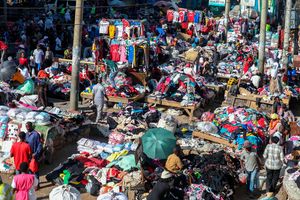Insurgency in Nigeria’s North East killed 300,000 children – Unicef

A man reacts as he reunites with his son, who was kidnapped, upon his release in Katsina, Nigeria on December 18, 2020. Unicef says Nigeria's insurgency in the North East has killed 300,000 children.
The United Nations Children’s Fund (Unicef) has reported that more than 300,000 children have died and over one million pushed out of school in 12 years of an insurgency in Nigeria’s North East region.
New data from the agency on the condition of children in the states of Borno, Adamawa and Yobe since 2009, when Boko Haram fighters first struck in the region, show that 5,129 out-of-school children are battling mental illnesses as a result of the conflict.
Unicef said the deaths underlined the direct and indirect attacks on children.
“Children killed in crossfires, improvised explosive devices (IEDs), children used as suicide bombers, children killed by malnutrition, among others,” said Peter Hawkins, Unicef’s representative in Nigeria.
“The scars of conflict are real and enduring for children. Too many children in northeast Nigeria are falling victim to a conflict they did not start.
“Attacks against children must stop immediately. In the meantime, we are committed to working with our partners to provide psychosocial and other support to conflict-affected children so they can regain their childhood and restart their lives.”
Hawkins said that the EU-funded Support to Early Recovery and Resilience Project, implemented by Unicef, was aimed at improving the mental health of 5,129 out-of-school children in Borno state.
He also said that stress and violence had been linked to poor brain development, depression and poor self-esteem and children exposed to conflict and violence were at risk of long-term mental health and psychosocial issues.
The conflict-affected out-of-school children in Borno were receiving services, including mental health support in safe spaces to strengthen their well-being, resilience, literacy skills and self-reliance, he said.
The agency’s intervention had provided 15,552 children with vocational training, 1,610 with literacy and numeracy skills, and 5,194 were enrolled into integrated Qur’anic schools.
The spokesman for the Nigerian army, Gen Onyeala Nwachukwu, has expressed worries that terrorists loyal to the Islamic State West Africa Province (ISWAP) remained relentless in their campaign as they have embarked on mass recruitment of terrorists.
At the headquarters of the Theatre Command for Operation Hadin Kai of the Nigerian army in Maiduguri, Borno state capital, he said: “I would like to mention that ISWAP, very recently, has been depleted by the surrendering of their members, as well as a conflict between them.
“They have embarked on what I will call a massive recruitment drive and I consider it very important to engage the media to block this recruitment.”
He noted that Boko Haram insurgents have been surrendering.
He explained that the troops had succeeded in curtailing the jihadist groups after insurgents almost took over the three state capitals of Adamawa, Borno and Yobe.
Three years ago, Boko Haram was advancing towards Abucha. Today they have been boxed into the Timbuks (islands in the Lake Chad region).





